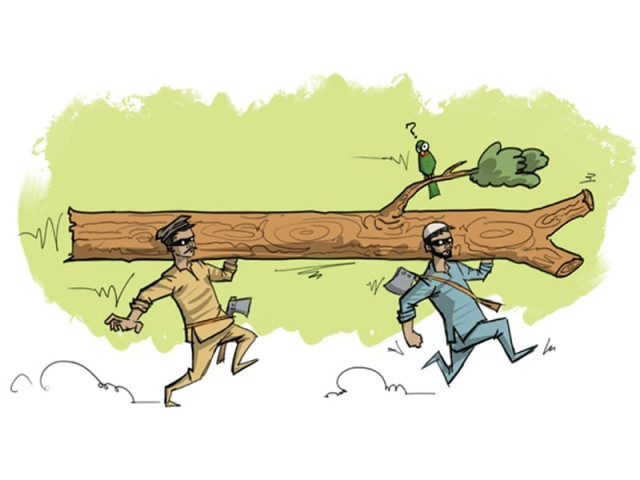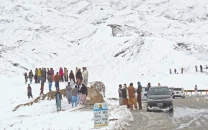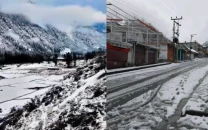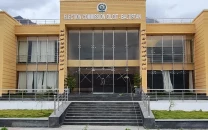Timber movement: Illegal transportation from G-B continues unabated
PM Sharif had ordered withdrawal of Diamer timber movement policy on July 5.

Between 2000 and 2005, Pakistan’s forest cover declined by more than 2%. ILLUSTRATION: JAMAL KHURSHID
The threat to forests in Gilgit-Baltistan’s (G-B) Diamer district may not have disappeared after all.
Locals have alleged that the transportation of illegally-cut timber from Diamer to the rest of the country is still being carried out, in violation of a July 5 order by Prime Minister Nawaz Sharif to withdraw the Diamer timber movement policy.
The policy, which was notified by Sharif’s predecessor Raja Pervaiz Ashraf a day before he left office, had allowed four million cubic feet (cft) of legally and illegally cut timber, worth an estimated Rs8 billion, lying in Diamer’s forests to be transported down country. But it just provided an excuse for the influential timber traders to chop more trees illegally and move them away from Diamer, according to environment activists.

Locals have alleged that the transportation of illegally-cut timber from Diamer to the rest of the country is still being carried out. PHOTO COURTESY: ALI AHMAD JAN
“The transport of illegal timber has not stopped. Around 400 trucks had crossed the forest barrier at Shatial on Karakoram Highway with an estimated 250,000 cft of timber altogether,” said Ali Ahmad Jan, an environmentalist and native of G-B.
He said the movement of trucks had continued till 11am on Tuesday, when he had left from G-B for Islamabad.
Chilas native Khan Muhammad Qureshi alleged that the movement did not stop on Tuesday.
He claimed 200 trucks carrying timber left Chilas on Friday night.
Qureshi alleged that the town’s divisional forest officer was conniving with influential timber traders to transport the logs, which costs around Rs30 per cft in Chilas but are sold for Rs3,000 in the markets of Lahore and Karachi.
“The forest officer is going to claim he did not receive the notification from the PM Secretariat, even though it was made public on Monday, July 8,” said Qureshi.
Meanwhile, the July 5 directive from Sharif --- who as Prime Minister of Pakistan is also the G-B council’s chairman --- had cancelled Ashraf’s March 15 notification and had ordered an earlier Cabinet Division decision to be implemented.
The Cabinet’s earlier decision, dated February 29, 2008, had ordered that all illegally cut timber from the northern areas should be transported by September 30, 2008, and anything left over should be confiscated by the government. This means that the government should take possession of any illegal timber presently lying in Diamer.

Men loading trucks with timber after the expiry of the deadline. PHOTO COURTESY: ALI AHMAD JAN
The July 5 order also directed the G-B Council secretary to submit a report about the cancelled timber movement policy to the PM office within a week, after incorporating the views of G-B’s chief secretary, the Climate Change Division and other stakeholders. G-B Council officials could not be reached for comment.
Environmentalist and Himalayan Wildlife Foundation Chief Executive Officer Dr Anisur Rahman said there should be a zero deforestation policy in Pakistan.
“Influential timber traders are the only people that benefit from timber movement policies,” he said.
World Wide Fund for Nature Pakistan Director-General Ali Hassan Habib said that the decision taken by Ashraf on timber movement had given the timber industry a free hand and contributed to the felling of an increasing number of trees from March 2013.
“The previous decision exacerbated deforestation in Diamer district and increased the risk of silting in Tarbela Dam, which is fed by the Indus River and its tributaries,” said Habib. “Deforestation and increased silting were key factors which aggravated the impact of the floods in 2010.”
He said environmentalists were hopeful that the present government would take more steps towards recognising important environmental issues facing the country.
Some startling facts and figures about deforestation
A 2011 report by FAO had put Pakistan’s total forest cover at 2% of the country’s total area. The Economic Survey of Pakistan 2012-13, however, claims the forest area is 5.2%, a figure that is contested by environmentalists.
Between 2000 and 2005, Pakistan’s forest cover declined by more than 2%.
Deforestation in Gilgit-Baltistan exposes the rest of the country due to effects of climate change.
Unlike Pakistan, forestry was placed on the concurrent list in India. India’s forest cover has increased to 23% in less than 40 years.
Forest area in G-B is estimated at 4.8% or 0.34 million hectares.
The private forests are mostly located in Chilas, Darel and Tangir valleys covering an area of 217,088 hectares.
A study showed deforestation in G-B at the rate of 10% during 1997-2002
Published in The Express Tribune, July 15th, 2013.


















COMMENTS
Comments are moderated and generally will be posted if they are on-topic and not abusive.
For more information, please see our Comments FAQ